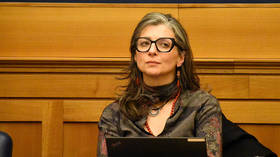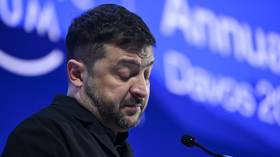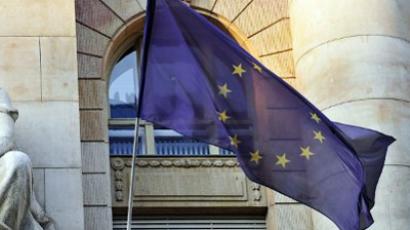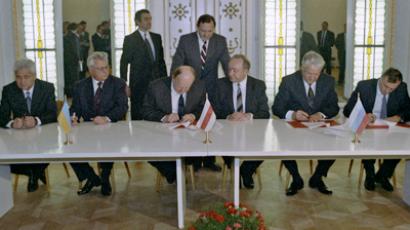Soviet collapse more costly than WWII - Primakov
Former Russian Prime Minister Evgeny Primakov was one of a handful of people watching history unfold from inside the corridors of power in Moscow as the Soviet Union unravelled two decades ago.
RT has met with the politician. Here is his sober and impartial account of what happened.RT:Do you perhaps recall saying once that you do not understand what stopped the President of the USSR, Mikhail Gorbachev, from using military force in order to prevent the signing of the treaty enforcing the dissolution of the USSR in 1991? Do you think that the USSR should have been preserved at any cost?Evgeny Primakov: You see, I don't even think there was any need for military force. What could have been done – that's my opinion while others may have theirs – but I think that the Belarusian military district could have been given an order to encircle the three leaders in Belovezhskaya Pushcha, drunk and groggy on their legs, just about to sign off these documents that they were jotting down on the spot, and simply taken them to their homes instead of arresting them and just taken away these papers. But this was not the key thing. The key thing was – and it was brought to Gorbachev's attention, and I did tell him about it, too, in the presence of others – that one should have started with an economic treaty. If we had signed a treaty establishing a single economic space I think it would have been a step towards preserving an upgraded, modernized Soviet Union which could have freed itself from the darker parts of its legacy. Gorbachev gave a public response the next day after we had made these suggestions to him. He said he didn't think an economic treaty should be signed first because he was sure it would jeopardize the signing of the political treaty which he thought had been pre-agreed. One thing that wasn't considered properly was that once a single economic space is in place, relevant super-national political structures will develop – that's inevitable. That's why we should have started with an economic treaty and many in fact were ready to go along with that. Even the Baltic states were ready to go along with the idea of preserving a single economic space.RT: If we look back at history, any large empire dissolves sooner or later. Do you think that having a single economic space would have been enough to avert dissolution?EP: Of course it wouldn't have been enough. But it would have been a huge contribution to averting dissolution. And you see, we can't really compare that situation with today, for instance, as they are completely different, and that's because back then in the Soviet Union, everything was centralized and existed as a single system. And no one gained anything through dissolution, no one did. Perhaps Russia benefited a little more than the others because it's larger and stronger, and has a more developed economy. But on a large scale, no one gained anything. That's beyond question. By now, the republics have evolved into sovereign states which have come a long way and developed connections and relations with other states in the West and with China, and so on. Thus it's a completely different picture.But even today, creating a single economic space, if it's done properly full-scale – and we currently have agreements with Belarus and Kazakhstan pertaining to that, and it's possible that Kyrgyzstan will join in – if it all goes well it'll be one of the pillars securing integrity and preventing any dissolution.RT: Do you think it's possible to restore something similar to the Soviet Union through a Eurasian Economic Community which comprises several post-Soviet republics?EP: No, I don't think of it as anything similar to the Soviet Union. There's nothing today that can be similar to the Soviet Union in any way. But integration is one of the driving forces of globalization, and it's taking effect everywhere. And if we go along with these forces – and today we can say that the trans-nationalization tendency in business, as well as integration processes at state level are the driving forces of today's reality – so if we succeed in going along with them, if we take over these forums and promote our agenda through them, this agenda will not differ much from that of the West but will additionally focus more on the national interests of each state [and] I think it'll be a great advantage.RT: As you pointed out, it is a well-known fact that economic problems were the primary contributing factor to the USSR's dissolution. Today, if we look at the US and the EU shaken by a powerful economic crisis – can we expect Europe or America to dissolve at some point, too, similar to the way the USSR did?EP: No, I don't think so. Of course some serious impact is inevitable in the case of Europe. I recall a talk I had with a person I deeply respect, former Chancellor Schmidt of West Germany. He is now 92 or 93 and he's still a totally bright person. I had an insightful conversation with him last year. He said the events in the eurozone would have an impact. He believes it could, on the one hand, lead to a deeper integration of a number states within the EU in terms of foreign policy, defense and other issues. On the other hand, the old-timers of the union, who have complied with the requirements, would have a different attitude to those who joined the union just recently.RT: Here’s a hypothetical question. Just several years after the collapse of the Soviet Union, NATO bombed Yugoslavia. If the USSR had not collapsed, do you think NATO would have gone ahead with operations in Yugoslavia, Afghanistan, Iraq, Libya?EP: Talking of NATO’s involvement in Yugoslavia, I think it could have taken place even when the USSR was still alive because the alliance acted without permission of the UN Security Council. But there is much more to it. In the few years after the dissolution of the USSR, I mean in the first half of the 1990s, our foreign policy was to show support for the US position, to follow in its footsteps. The position of the Foreign Ministry, voiced by its head, was as follows: “We desperately need to become part of the civilized world, by any means. The rest is gibberish.”So the West must have seen that such sentiment was present in post-Soviet Russia, and may still be prevailing in some circles.That is why they felt an ever-growing desire to act independently, without taking notice of the Soviet Union or Russia.RT: What price did Russia have to pay for such a spineless policy when, as you said, it followed in the footsteps of the US?EP: The price was tremendous. Economically, Russia lost more than during the Second World War. Such was the price. The scale of the losses would become clear if all people had a chance to watch the hearings in a London court between Boris Berezovsky and Roman Abramovich and listen to the horrendous stories of how businesses were given protection by Kremlin officials or the way privatization was carried out. With that in mind, it would be insane to say that the country benefited from the 1990s.RT: And here’s the final question. The USSR promoted a certain ideology. Any strong state needs to have an ideology. Do you think Russia has come up with one of its own?EP: What they call the national idea has not been articulated yet. We all work to make people’s lives better and safer. The demographic situation needs improving. The economic model needs an overhaul, because the one that was in place before the 2008 crisis will not work in the future. These challenges are evident, and taken together, they represent Russia’s national idea.In its special project "20 years post-Soviet," RT attempts to analyze the reasons behind the demise of the USSR and take a closer look at Russia’s Soviet legacy.














